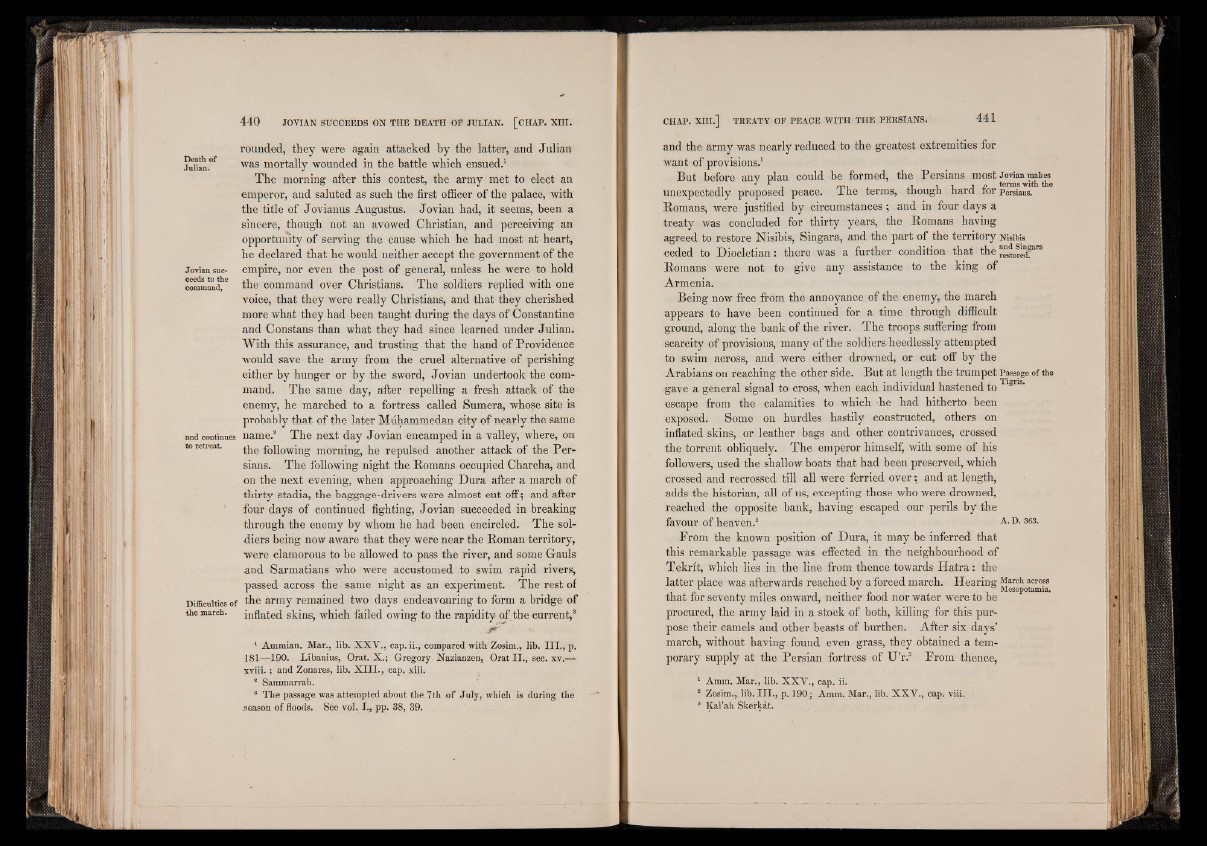
rounded, they were again attacked by the latter, and Julian
was mortally wounded in the battle which ensued.1
The morning after this contest, the army met to elect an
emperor, and saluted as such the first officer of the palace, with
the title of Jovianus Augustus. Jovian had, it seems, been a
sincere, though not an avowed Christian, and perceiving an
opportunity of serving the cause which he had most at heart,
he declared that he would neither accept the government of the
empire, nor even the post of general, unless he were to hold
the command over Christians. The soldiers replied with one
voice, that they were really Christians, and that they cherished
more what they had been taught during the days of Constantine
and Constans than what they had since learned under Julian.
With this assurance, and trusting that the hand of Providence
would save the army from the cruel alternative of perishing
either by hunger or by the sword, Jovian undertook the command.
The same day, after repelling a fresh attack of the
enemy, he marched to a fortress called Sumera, whose site is
probably that of the later Muhammedan city of nearly the same
and continues name.2 The next day Jovian encamped in a valley, where, on
to retreat. following morning, he repulsed another attack of the Persians.
The following night the Romans occupied Charcha, and
on the next evening, when approaching Dura after a march of
thirty stadia, the baggage-drivers were almost cut off; and after
four days of continued fighting, Jovian succeeded in breaking
through the enemy by whom he had been encircled. The soldiers
being now aware that they were near the Roman territory,
were clamorous to be allowed to pass the river, and some Gauls
and Sarmatians who were accustomed to swim rapid rivers,
passed across the same night as an experiment. The rest of
Difficulties of the army remained two days endeavouring to form a bridge of
the march, inflated skins, which failed owing to the rapidity of the current,3
% Ammian. Mar., lib. X X V ., cap. ii., compared with Zosim., lib. I I I ., p.
181—190. Libanius, Orat. X.; Gregory Nazianzen, Orat I I ., sec. xv.—
x v iii.; and Zonares, lib. X I I I . , cap. xiii.
2 Sammarrah.
3 The passage was attempted about the 7th of July, which is during the
season of floods. S§e vol. I., pp. 38, 39.
Death of
Julian.
Jovian succeeds
to the
command,
and the army was nearly reduced to the greatest extremities for
want of provisions.1
But before any plan could be formed, the Persians most Jovian mates
m i , i i i j n terms with the unexpectedly proposed peace, lh e terms, though hard for Persians.
Romans, were justified by circumstances; and in four days a
■treaty was concluded for thirty years, the Romans having
agreed to restore Nisibis, Singara, and the part of the territory Nisibis
ceded to Diocletian: there was a further condition that the restored?1”
Romans were not to give any assistance to the king of
Armenia.
Being now free from the annoyance of the enemy, the march
appears to have been continued for a time through difficult
ground, along the bank of the river. The troops suffering from
scarcity of provisions, many of the soldiers heedlessly attempted
to swim across, and were either drowned, or cut off by the
Arabians on reaching the other side. But at length the trumpet Passage of the
gave a general signal to cross, when each individual hastened to lsrls'
escape from the calamities to which he had hitherto been
exposed. Some on hurdles hastily constructed, others on
inflated skins, or leather bags and other contrivances, crossed
the torrent obliquely. The emperor himself, with some of his
followers, used the shallow boats that had been preserved, which
crossed and recrossed till all were ferried over; and at length,
adds the historian, all of us, excepting those who were drowned,
reached the opposite bank, having escaped our perils by the
favour of heaven.2 D- 363-
From the known position of Dura, it may be inferred that
this remarkable passage was effected in the neighbourhood of
Tekrit, which lies in the line from thence towards Hatra : the
latter place was afterwards reached by a forced march. Hearing March across
1 i * i j? i -i Mesopotamia. that for seventy miles onward, neither food nor water were to be
procured, the army laid in a stock of both, killing for this purpose
their camels and other beasts of burthen. After six days’
march, without having found even grass, they obtained a temporary
supply at the Persian fortress of U ’r.3 From thence,
1 Amm. Mar., lib. X X V ., cap. ii.
s Zosim., lib. I I I ., p. 190; Amm. Mar., lib. X X V ., cap. viii.
3 Kal’ah Skerkat.